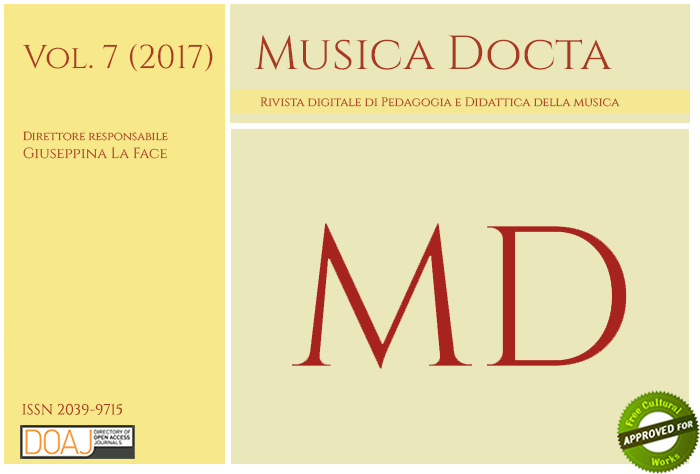Voci non umane e orecchi per sentirle: concezioni a confronto nell’incipit della “Notte sul Monte Calvo” strumentato da Musorgskij e da Rimskij-Korsakov
DOI:
https://doi.org/10.6092/issn.2039-9715/7616Keywords:
fantasy, orchestration, music communicationAbstract
Studies on fantasy literature have carried out an in-depth exploration of the mechanisms of storytelling, but have barely addressed the potential of fantasy in music, often even implying that music cannot possibly express the sense of bewilderment and dizziness that is commonly taken to be one of the defining elements of fantasy. The purpose of this paper is to suggest how to focus the attention of an audience of young people, or students, on aspects pertaining to instrumentation, comparing two different versions of the beginning of the same score - Modest Mussorgsky’s Night on Bald Mountain in the author’s version and in that of Rimsky-Korsakov. The differences identified also point to the ability of musical language to reinforce and manipulate the imaginative nature of the piece, and to test, through an extremely lucid use of timbric means, the limit up to which we can push in denoting it.Downloads
Published
2017-12-29
How to Cite
Fava, E. (2017). Voci non umane e orecchi per sentirle: concezioni a confronto nell’incipit della “Notte sul Monte Calvo” strumentato da Musorgskij e da Rimskij-Korsakov. Musica Docta, 7(1), 35–49. https://doi.org/10.6092/issn.2039-9715/7616
Issue
Section
Articles
License
Copyright (c) 2017 Elisabetta Fava
The copyrights of all the texts on this journal belong to the respective authors without restrictions.
This journal is licensed under a Creative Commons Attribution Share-Alike 4.0 International License (full legal code).
See also our Open Access Policy.
Metadata
All the metadata of the published material is released in the public domain and may be used by anyone free of charge. This includes references.
Metadata — including references — may be re-used in any medium without prior permission for both not-for-profit and for-profit purposes. We kindly ask users to provide a link to the original metadata record.






